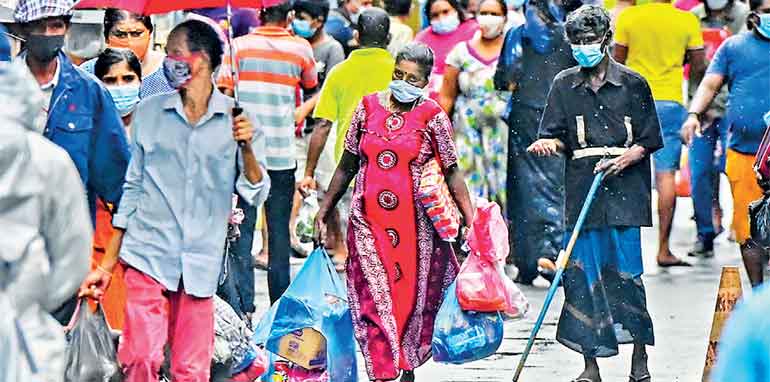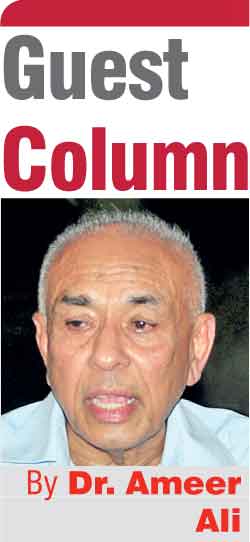Restructuring the economy: A stock take
Thursday, 4 May 2023 00:05 – – 25
 The real struggle for financial stability and economic growth is yet to begin
The real struggle for financial stability and economic growth is yet to begin
 After a historic financial bankruptcy followed by an unprecedented economic crisis, the small open economy of Sri Lanka ignored the call for system change and went for the 17th time in search of funds and advice for damage control from the watchdog of the ruling economic order, IMF. It received help after agreeing to comply with all of IMF’s conditionalities. As a result, amidst a new bout of higher taxes and tariffs accompanied by drastic cuts in public expenditure, all part of an IMF dictated budget, some semblance of financial stability has been achieved.
After a historic financial bankruptcy followed by an unprecedented economic crisis, the small open economy of Sri Lanka ignored the call for system change and went for the 17th time in search of funds and advice for damage control from the watchdog of the ruling economic order, IMF. It received help after agreeing to comply with all of IMF’s conditionalities. As a result, amidst a new bout of higher taxes and tariffs accompanied by drastic cuts in public expenditure, all part of an IMF dictated budget, some semblance of financial stability has been achieved.
All political parties except NPP/JVP, which alone has committed for system change, along with a few breakaway members of SLPP, either voted for or abstained from voting to the IMF deal. Washington’s remote control of the economy is now fait accompli. President Ranil Wickremesinghe is credited for this little achievement and understandably is basking in the warmth of a short-term popularity.
Yet, the real struggle for financial stability and economic growth is yet to begin. There is one hurdle, which CBSL and the Government have to negotiate and overcome, and there is another danger lurking afar and over which Sri Lanka has no control. Together, these two may nullify even the little that has been achieved so far, push back the economy further, increase hardships to the commoner, and at the end, could result in open resistance against the ruling regime. On the positive side, that resistance may finally force the desired system change as demanded by the Aragalaya youth.
The hurdle
The hurdle is the expected negotiation with private creditors which is scheduled to start this month. Although the two main creditors outside the Paris Club, namely India and China along with Japan who is a club member, had declared a united but sympathetic stand on debt restructuring, that cannot be said about the IMF, who is the guardian of international capital. IMF, apart from helping open economies in trouble, is also a debt collector on behalf of its shareholders and international lenders. In that sense, there is an inherent contradiction between the IMF’s role as lender of last resort to economies that are buried in foreign debt and its constitutional duty to protect the international monetary order by ensuring the profitability of private lending like that from the Paris Club.
Thus, if the IMF is confident of macroeconomic stability and economic prosperity in Sri Lanka provided the RW regime translates into action all those conditions stipulated by the IMF Board, then why should the creditors be extraordinarily lenient towards Sri Lanka’s debt settlement? Therefore, the real dilemma facing Sri Lankan negotiators at the table would be whether to argue their case for special concession from a position of confidence in the future of the economy, as promised by the IMF deal, or, from a state of uncertainty and scepticism arising from IMF’s own pessimism about growth in mature economies over which Sri Lanka has no control. This is the external danger referred to above.
Slow growth in mature economies would constrain their demand for imports from Sri Lanka, and without that demand Sri Lanka’s growth would be in jeopardy. The apparel industry is already feeling this crunch. Ironically though that danger could be used as a bargaining chip to win favourable terms at the negotiating table.
Besides, there is another trump, which if used with diplomatic skill could win the same, and that is the strategic position of Sri Lanka in the Indian Ocean, which has now emerged as the main theatre of action in keeping the diplomatically hyped and so-called “yellow peril” at bay. This strategic placement is nature’s gift to the island, and if the lenders behave like Shylock, they may drive Sri Lanka to bargain away that advantage for better assistance from another camp.
Domestic debt restructuring
Apart from restructuring external debt, domestic debt restructuring (DDR) is also crucial to economic revival. Sri Lanka Banks Association (SLBA) is rightly concerned about transparency in these negotiations. Whether the IMF has a hidden agenda on DDR seems to be one of their concerns. Banking sector’s capital liquidity and public confidence in the banking system are crucial for successful implementation of CBSL’s monetary policy. The SLBA pointed out that “credit impairments have hit an all-time high hitherto unseen” and warns that “taking further impairment costs on top of these strains on capital and liquidity is not sustainable especially with the tax deductibility of these necessary costs of being in business”. Domestic investment would be imperilled if DDR turns adversarial to the banking sector.
RW is not unaware of the difficulties that face the economy even though like a good salesman he is trying to oversell what has been achieved so far. Sri Lanka is experiencing its worst financial and economic crisis at a time when the global neoliberal economic order itself is in a state of crisis. Recently, the World Bank was suggesting that the 2020s would be a lost decade for most of the matured economies. There is a banking crisis in vogue. Following the collapse of the Swan Valley Bank, and Signature Bank in the US and Credit Suisse in Europe the Federal Reserve in the US and Bank of Switzerland in Europe had to come to their rescue. Lately, the First Republic Bank in the US also collapsed although it was swallowed up by JPMorgan.
These are signs that indicate there is something systematically wrong in the world financial structure, and if the financial crisis persists an economic crisis cannot be avoided. The war in Europe makes that possibility imminent. With inflation remaining stubbornly high and rising interest rates losing their sharpness to control it, mature economies are preparing for a hard landing. There is rising discontent in these economies and the establishment is trying in desperation to divert public attention to a hyped “yellow peril”.
Sri Lanka is caught between two systemic crises at the same time, one from its own system and the other from the global financial system. The combined effect of the two would make domestic economic revival slower and harder. Before that happens RW wants to make quick political capital out of what he has achieved so far. This is why he started talking about forming a national government, and when that did not happen, he invited SJB to join his own UNP to form a grand alliance with SLPP and go for an early election. He also seems to have dropped the controversial 13th Amendment to keep the Sinhalese nationalists calm, and invited the Tamil parties to collaborate “within the system” to find solution to the ethnic issue. All these are diversionary tactics to avoid the unavoidable system change and to turn young voters away from supporting the NPP.
(The writer is attached to Murdoch Business School, Murdoch University, Western Australia.)

